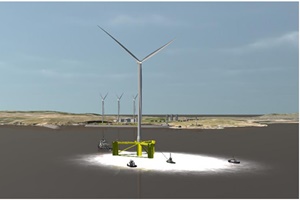 A review published by TS-FLOW JIP shows that temporary wet storage is crucial for the successful delivery of large-scale floating wind projects. Wet storage is needed for holistic assembly and integration because most UK port facilities lack space to store large floating offshore wind (FLOW) base units at their quaysides.
A review published by TS-FLOW JIP shows that temporary wet storage is crucial for the successful delivery of large-scale floating wind projects. Wet storage is needed for holistic assembly and integration because most UK port facilities lack space to store large floating offshore wind (FLOW) base units at their quaysides.
Without wet storage, projects are likely to face delays due to unforeseen production issues and limited weather windows for installation.
TS-FLOW JIP (UK North), with funding support from Crown Estate Scotland, has published its 'lessons learned' after working with developers, regulators, and port authorities. The highlights include:
- Developing wet storage areas will provide social value and support local economies, with each site potentially supporting around 1600 jobs, 75% of which can be local.
- Location options for wet storage sites are extremely limited. Only nine of over 70 sites screened in the UK North area met the baseline criteria. Ongoing development work continues to refine and define suitable locations.
- Consenting, licensing, and insurance compliance are highly complex and untested areas requiring intensive industry engagement.
- Collaboration with the offshore insurance industry is key for site development. The floating wind industry needs to demonstrate that wet storage significantly lowers project risk and subsequent insurance premiums.
TS-FLOW JIP, delivered by Offshore Solutions Group and HR Wallingford, aims to develop fully functional, temporary wet storage sites in the Celtic Sea and UK North (Scotwind/Intog) leasing zones.









